A step-by-step tutorial on how to soak and dehydrate nuts. It's so important to know where our food comes from and how we should go about processing it for maximum health benefits. Let me show you how to do exactly that.
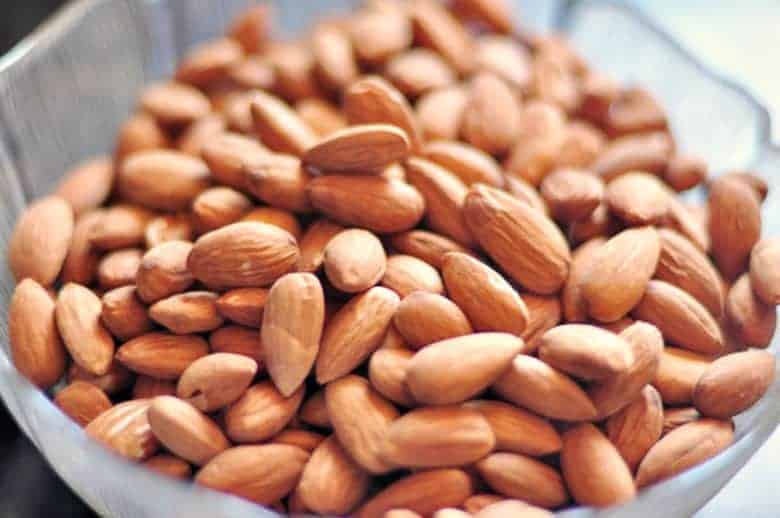
Learning about soaking nuts and dehydrating nuts is an easy way to properly prepare them so as to neutralize phytic acid and make them more digestible. Crispy Nuts is a great start to delicious homemade trail mix - my children love it!
Phytic acid
Do you know what phytic acid is and what it does?
Phytic acid is present in the bran of all grains and the hulls of nuts and seeds. Phytic acid inhibits the absorption of minerals - especially calcium, copper, iron, magnesium, and zinc - in the body.
Proper preparation of soaking nuts and grains neutralizes the phytic acid, making them more easily digested plus increases the nutritional value!
The following tutorial for soaking nuts is based on the Crispy Nuts recipe found in the Nourishing Traditions cookbook written by Sally Fallon. I think this cookbook is a must for every REAL food kitchen. If you don't have it yet, you are in for a treat!
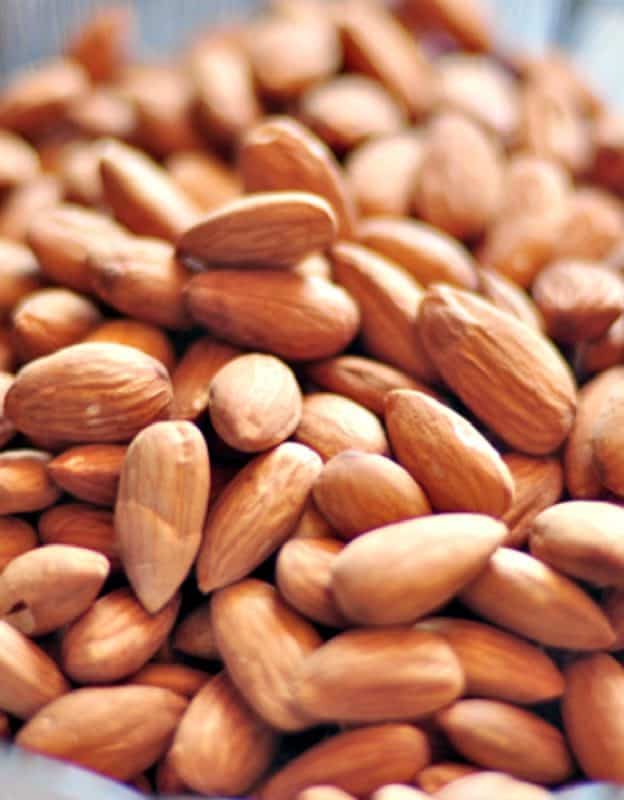
Instructions
It's so important to know where our food comes from and how we should go about processing it for maximum health benefits. Soaking unlocks nutrients and makes it more digestible!
Here's how we do it:
- Mix the nuts, salt, and water and leave overnight to soak.
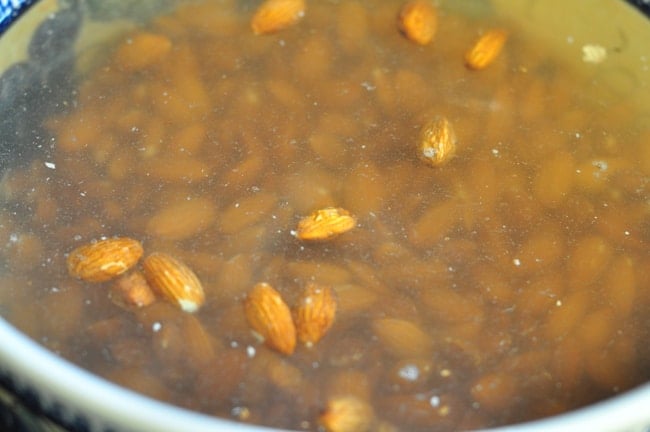
- In the morning, drain the water from the nuts. I don't rinse them - they are good with a hint of saltiness.
- Spread the nuts on a cookie sheet.
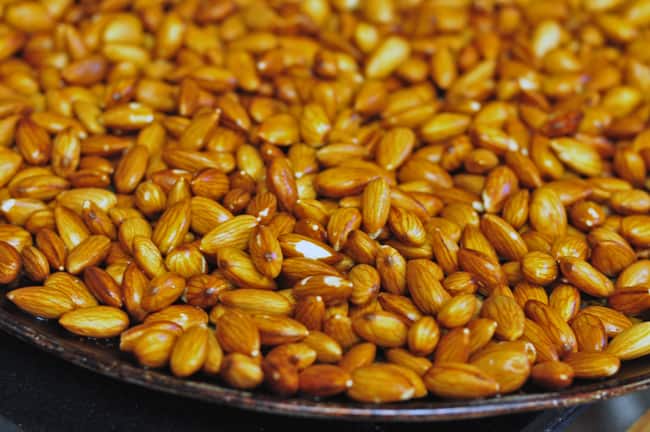
- Place in a warm oven - 170F for 12 - 24 hours - My oven only goes down to 170F but if I am using the dehydrator, I set it to 150F. Stir occasionally until the nuts are completely dry and crisp. Make sure to dry the nuts completely or they may mold if kept over 2 weeks.
- Store in an airtight container.
Cashews take a bit more care because even if they are "raw", they have already been heated twice during processing. Do not soak cashews too long or dry them out too slowly - they develop a bad taste.
For cashews, soak in saltwater for 12 hours and dry in an oven set to 200F.
Frequently Asked Questions
Why is it important to soak and dehydrate nuts?
Nuts contain enzyme inhibitors, such as phytic acid, that impact your ability to absorb other nutrients. This is why they are called anti-nutrients. The enzyme inhibitors also make the nuts more difficult for your body to digest.
Soaking the nuts mimics the process of germination, telling the seed it is ready to grow, and making the enzyme inhibitors go away.
Do I have to dehydrate the nuts after soaking them?
It is not necessary to dehydrate the nuts, but it is recommended. Dehydrating the nuts after soaking returns them to their crispy state. If you choose not to dehydrate the nuts, store them in the refrigerator, but they will only last a few days.
What is phytic acid?
Phytic acid is an anti-nutrient. It prevents your body from absorbing minerals and binds with them to make them unavailable to the body for use.
Why do I need to add salt?
The salt activates enzymes that neutralize the phytic acid which is an enzyme inhibitor.
How long can I store dehydrated nuts?
Store soaked and dehydrated nuts in an airtight container, or a mason jar works great. As long as the nuts are thoroughly dried they will keep in the pantry for a couple of weeks. To extend their shelf life, they can be stored in the refrigerator.
Tips
Soaking and dehydrating nuts is much easier than you'd think and so important in order to maximize the health benefits.
- Cashews require a shorter soaking time to keep them from developing a poor taste. They should not be soaked for longer than 12 hours.
- Use filtered water when soaking your nuts to ensure the best end result. Regular tap water contains chemicals that we don't want to be absorbed into the nuts.
- Avoid using table salt as it has no nutritional value.
- If you are not sure how long to dehydrate the nuts, taste them after 6 hours and every hour after that until they are dry and crispy.
If you’ve tried this recipe for soaking nuts and dehydrating them or any other recipe on Cultured Palate please take a minute to rate the recipe and leave a comment letting me know how you liked it. I love hearing from you! You can also FOLLOW ME on PINTEREST, FACEBOOK, INSTAGRAM, YouTube and TWITTER.
📋 Recipe
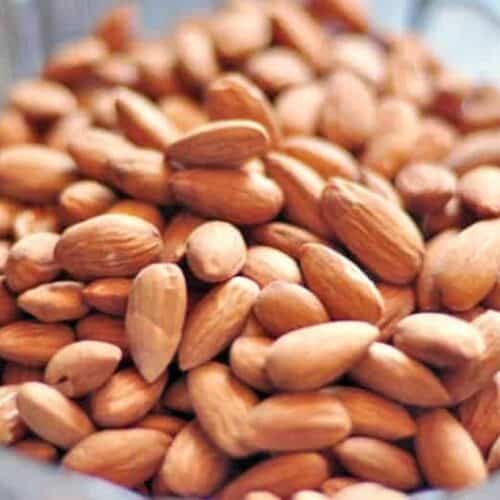
How to Soak and Dehydrate Nuts
Ingredients
- 4 cups raw nuts - almonds, pecans, cashews, peanuts, hazelnuts
- 2 tablespoons sea salt
Instructions
-
Mix the nuts, salt and water and leave overnight to soak.
-
In the morning, drain the water from the nuts. I don't rinse them - they are good with a hint of saltiness.
-
Spread the nuts on a cookie sheet.
-
Place in a warm oven - 170F for 12 - 24 hours - My oven only goes down to 170F but if I am using the dehydrator, I set it to 150F.
-
Stir occasionally (if you think about it) until the nuts are completely dry and crisp. Make sure to dry the nuts completely or they may mold if kept over 2 weeks.
-
Store in an airtight container.
Notes
- Cashews take a bit more care because even if they are "raw", they have already been heated twice during processing. Do not soak cashews too long or dry them out too slowly - they develop a bad taste. For cashews, soak in salt water for 12 hours and dry in an oven set to 200F.









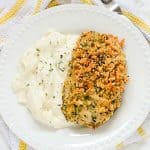


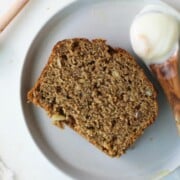
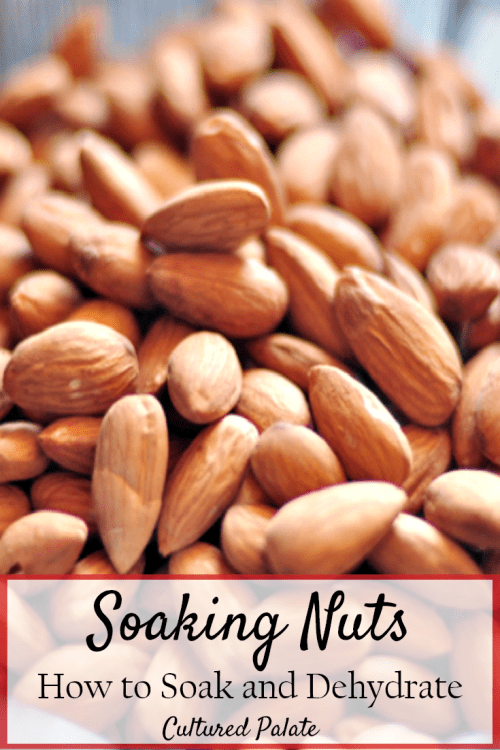
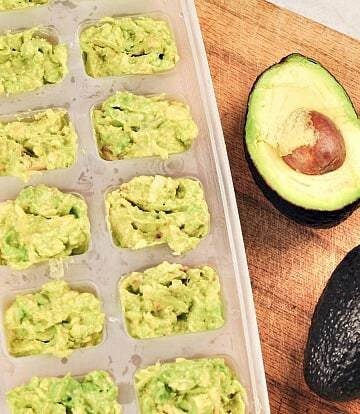
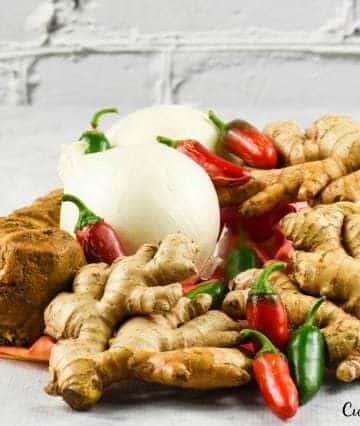


Eternity Shaina
I'm a little confused. Three questions:
Why are you using salt?
Don't you need raw nuts to sprout?
Why are you cooking(such a high temperature) them especially if you are recommending raw nuts?
Dina-Marie
Eternity, the salt activates enzymes that neutralize the phytic acid which is an enzyme inhibitor. Raw nuts are needed to sprout and I have updated the recipe to specify raw. The purpose of soaking them is to break down the phytic acid and sprouting is a secondary benefit which also makes them more digestible. If you only heat to 150F you will maintain all of the enzymes of the raw nuts but my oven only goes down to 170F so if I use my oven, that is the temp. I use. But, if I am using the dehydrator, I set it to 150F which is as low as it goes - it is just very large and I am not always doing enough nuts to warrant using it.
Shannon
I have a dehydrator that only has two settings - on and off. How long should I have them in the dehydrator?
Dina-Marie
Shannon, I would taste them after 6 hours - they need to be crispy and dry. If they are not done, continue dehydrating and tasting every hour or so.
Miachel (Spiced Curiosity)
Very nice to know. I've heard of Phytic Acid from World's Healthiest Foods, but haven't read more on it. Thanks for sharing! :)
Evelyn
Could you make a large batch and store them in the freezer so they don't spoil?
Dina-Marie
Yes, Evelyn, I have done that and it works great!
Adam
Hi Dina I have a question. is the dehydrator necessary if I just want to eat the almonds by itself?
Even if I don't use a dehydrator will the acids and enzyme-inhibitor be gone if I JUST soak them in JUST water for 10 hours overnight and then ready to eat?
Thanks!
Dina-Marie
Adam, yes you can just soak them overnight and that is enough to start the soaking process. I normally do this for almonds that I will keep in the refrigerator and eat within a couple of weeks as a snack. I also will put a bit of kefir or yogurt and sea salt in the soaking water to help break down the phytic acid.
Tonya Bowles
Are the nuts that I buy at the health food store? Do they have to specifically state "RAW"
I have some walnuts in the freezer that I wouls like to dehydrate
Thank You for your help
Dina-Marie
Tonya, if the nuts are not raw, they have been heated during the processing and will not sprout. You can still dehydrate them but the soaking will not help neutralize the phytic acid.
Fabian
I have a question:
Is it possible to just soak nuts without drying in a dehydrator if I consume them rapidly (in 1 or 2 days)?
thank you
Fabian
Dina-Marie
Fabian, yes it is - I do keep mine in the refrigerator though.
Katie
How many hours does it take to dry the cashews in an oven at 200F?
Dina-Marie
Katie, as noted in the post, cashews take more care to dehydrate. I would begin with 5 hours and then keep a check on them. You don't want to dry them to slowly or they will get a bad taste - that is why the oven is set a bit higher.
James
So if the nuts have been cracked open already (as I purchased all of my last nuts) then there is no way to get rid of the phytic acid? Even almonds with the skin on still, say in a trail mix? I love the artical and am inspired by your story. Thank you for you time
Dina-Marie
James, you can definitely still soak and dehydrate them. I do soak almonds in the skin as you can see in the photos. But, I do use raw nuts as the ones in traditional trail mixes many times have already been processed. If you are buying raw trail mix, that is different.
Char
I’d like to make almond butter. Do I have to dry the nuts before putting them in the blender? And, I’d like to blanch and peel them first. Is that okay?
Dina-Marie
Char, to blanch and peel them first is fine. I would not dry them before making almond butter as they would be so dry it would be more difficult to grind. At least, that is what I have found using my Champion Juicer to make nut butters.